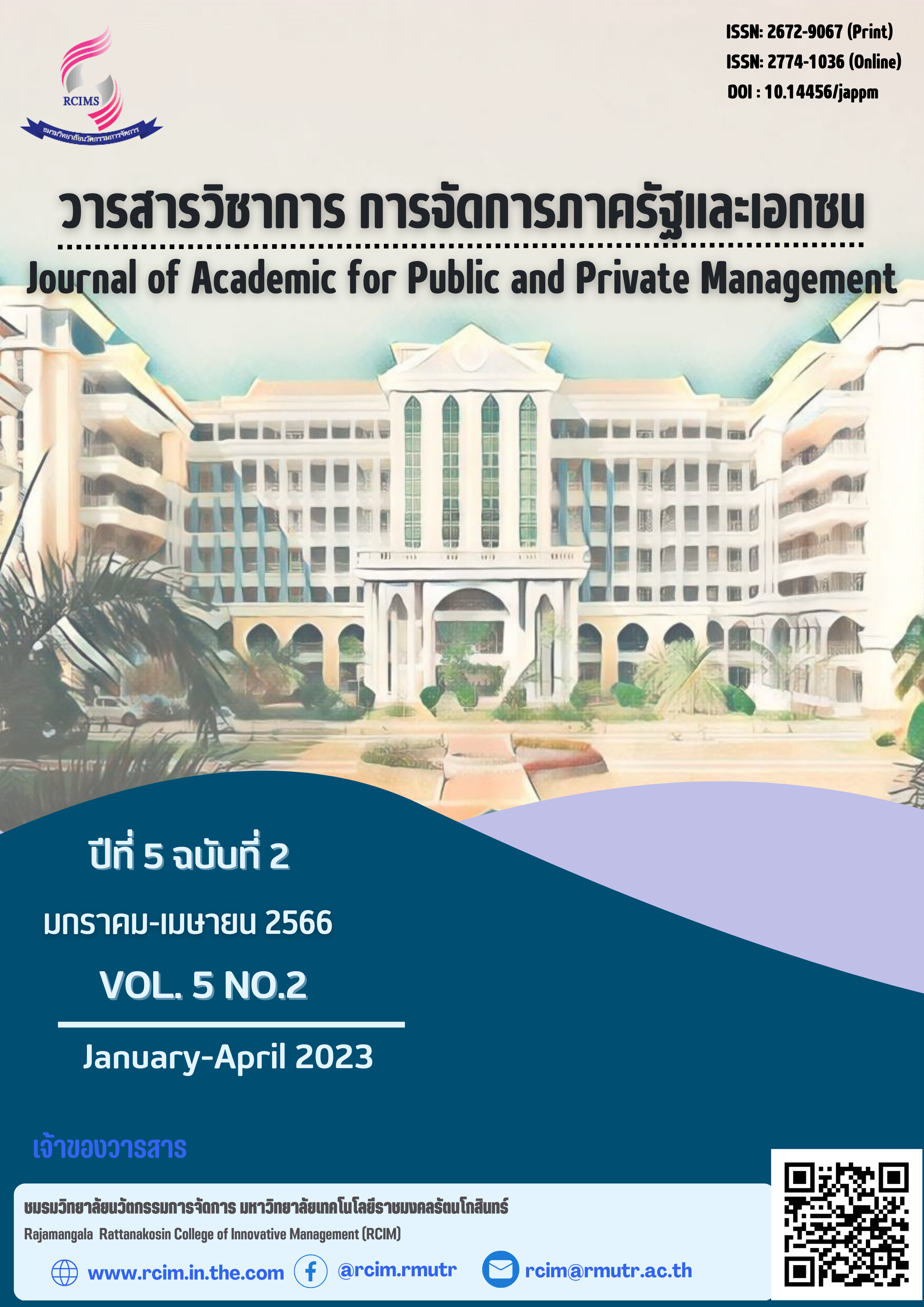การยอมรับเทคโนโลยีและนวัตกรรมในฐานะตัวแปรคั่นกลางที่เชื่อมโยงคุณภาพ ระบบสารสนเทศทางการบัญชีสู่ประสิทธิภาพการทำงานของบุคลากร ในองค์กรปกครองส่วนท้องถิ่น จังหวัดนครปฐม
Main Article Content
บทคัดย่อ
การวิจัยครั้งนี้มีวัตถุประสงค์ศึกษาการยอมรับเทคโนโลยีและการยอมรับนวัตกรรมส่งผลต่อประสิทธิภาพการทำงานของบุคลากรประกอบด้วย 1) เพื่อศึกษาปัจจัยคุณภาพระบบสารสนเทศทางการบัญชี การยอมรับเทคโนโลยี การยอมรับนวัตกรรม และประสิทธิภาพการทำงาน ของบุคลากรองค์กรปกครองส่วนท้องถิ่นภายในจังหวัดนครปฐม และ 2) เพื่อศึกษาปัจจัยการยอมรับเทคโนโลยีและการยอมรับนวัตกรรมในฐานะตัวแปรคั่นกลางที่เชื่อมโยงคุณภาพระบบสารสนเทศทางการบัญชีสู่ประสิทธิภาพการทำงาน ของบุคลากรในองค์กรปกครองส่วนท้องถิ่นภายในจังหวัดนครปฐม การวิจัยครั้งนี้เป็นการวิจัยเชิงปริมาณเครื่องมือคือแบบสอบถาม กลุ่มตัวอย่างที่ใช้ในการวิจัยนี้ คือบุคลากรทางการบัญชีภายในองค์กรปกครองส่วนท้องถิ่นภายในจังหวัดนครปฐมจำนวน 200 ตัวอย่าง ตามแนวคิดของ Hair โดยได้นำมากำหนดการสุ่มตัวอย่างตามหลักความน่าจะเป็น และใช้วิธีการสุ่มตัวอย่างแบบชั้นภูมิ โดยมีค่าดัชนีความสอดคล้อง (IOC) อยู่ระหว่าง 0.67-1.00 และมีค่าสัมประสิทธิ์แอลฟาของครอนบัคระหว่าง .929-.973 สถิติที่ใช้ในการวิจัย คือการวิเคราะห์ด้วยค่าร้อยละค่าเฉลี่ย ส่วนเบี่ยงเบนมาตรฐาน และการวิเคราะห์สมการโครงสร้าง (SEM) โดยใช้โปรแกรม Smart PLS 3.0
ผลการวิจัย พบว่า บุคลากรทางการบัญชีภายในองค์กรปกครองส่วนท้องถิ่นภายในจังหวัดนครปฐม มีระดับคุณภาพระบบสารสนเทศทางการบัญชีการยอมรับเทคโนโลยี การยอมรับนวัตกรรม และประสิทธิภาพการทำงาน มีค่าเฉลี่ยโดยรวมอยู่ในระดับมากทุกด้าน โดยมีค่าเฉลี่ยเท่ากับ 4.05, 4.08, 3.96 และ 4.14 ตามลำดับ และมีส่วนเบี่ยงเบนมาตรฐานเท่ากับ 0.743, 0.600, 0.628 และ 0.529 ตามลำดับ คุณภาพระบบสารสนเทศทางการบัญชีมีอิทธิพลทั้งทางตรงเท่ากับ 0.246 และทางอ้อมต่อประสิทธิภาพการทำงานมีค่าโดยรวมเท่ากับ 0.474
Article Details

อนุญาตภายใต้เงื่อนไข Creative Commons Attribution-NonCommercial-NoDerivatives 4.0 International License.
เอกสารอ้างอิง
ณัชริกาญจน์ เธียรวรนันท์. (2563). ปัจจัยที่ส่งผลต่อการเลือกใช้ระบบสารสนเทศทางการบัญชี กรณีศึกษา ธุรกิจอสังหาริมทรัพย์ในเขตกรุงเทพมหานครและปริมณฑล (การค้นคว้าอิสระบัญชีมหาบัณฑิต). มหาวิทยาลัยศรีทปุม.
พรศรี ลีลาพัฒนวงศ์ และทิพวรรณ ปิ่นวนิชย์กุล. (2562). ปัจจัยที่มีอิทธิพลต่อการยอมรับนวัตกรรมและเทคโนโลยี: กรณีศึกษายานยนต์ไฟฟ้า ประเภทยานยนต์นั่งส่วนบุคคลไม่เกิน 7 คน (รย.1). วารสารวิจัยและพัฒนา มจธ., 42(2), 131-144.
พัชรนันท์ รัตนบุรี. (2560). การยอมรับนวัตกรรมระบบสารสนเทศเพื่อการบริหารและประสิทธิภาพในการปฏิบัติงาน ของบุคลากร: กรณีศึกษามหาวิทยาลัยราชภัฏสงขลา (วิทยานิพนธ์บริหารธุรกิจมหาบัณฑิต). มหาวิทยาลัยทักษิณ.
เพ็ญพักตร์ สว่าง, ชาญเดช เจริญวิริยะกุล และสุดาวรรณ สมใจ. (2565). ประสิทธิผลในการบริหารงานของผู้บริหารองค์การบริหารส่วนตำบลดอนตูม จังหวัดนครปฐม. วารสารการวิจัยการบริหารการพัฒนา, 12(1), 44-56.
วันอามีนา บอสตัน อลี และสุมนา อาภาโรจน์กิจ. (2562). ปัจจัยหลักที่มีอิทธิพลต่อการยอมรับใช้เทคโนโลยีการพาณิชย์อิเล็คทรอนิกส์ของผู้ประกอบการในโครงการ WOW สงขลา. วารสารวิทยาการจัดการ, 36(2), 60 82.
สำนักงานส่งเสริมการปกครองท้องถิ่นจังหวัดนครปฐม. (2656). ข้อมูลการปกครอง, สืบค้นเมื่อ 29 ตุลาคม 2565, จาก https://www.ect.go.th/nakhonpathom/ewt_news.php?nid=43&filename =index
องค์กรปกครองส่วนท้องถิ่นจังหวัดนครปฐม. (2559). ข้อมูลพนักงาน อปท. ประจำปี 2560, สืบค้นเมื่อ 16 พฤศจิกายน 2565, จาก https://www.ect.go.th/nakhonpathom
อรจันทร์ ศิริโชติ. (2564). การยอมรับเทคโนโลยีของวิสาหกิจขนาดกลางและขนาดย่อมในจังหวัดสงขลา. วารสารมหาวิทยาลัยนราธิวาสราชนครินทร์ สาขามนุษยศาสตร์และสังคมศาสตร์, 8(2), 1-15.
Best, J. W. (1981). Research in Education. (4th ed.). Englewood Cliffs, New Jersey: Prentice-Hall.
Carolina, Y. et al. (2020). Internal control, AIS quality and accounting information quality: empirical evidence from higher education in west java-indonesia. In Proceedings of the 3rd International Conference on Big Data Technologies, 207-211.
Costa, L., Teixeira, A. & Brochado, A. (2021). Determinants of consumers’ frugal innovation acceptance in a developed country. Young Consumers, 22(2), 185-201.
Da Cruz Carvalho, A., Riana, I. G. & Soares, A. D. C. (2020). Motivation on job satisfaction and employee performance. International research journal of management. IT and Social Sciences, 7(5), 13-23.
Hair, J. F. Jr.et al. (2006). Multivariate Data Analysis, (6th ed). Upper Saddle River, NJ: Prentice Hall.
Hair, J. F. et al. (2019). When to use and how to report the results of PLS-SEM. European business review, 31(1), 2-24.
Huynh, Q. (2021). The effect of organizational culture on quality of accounting information: mediating the role of accounting information system. Accounting, 7(7), 1689-1694.
Julianto, I. P. & Yasa, I. N. P. (2019). The analysis of technology acceptance model (TAM) on the use of accounting information system. In Proceedings of the International Conference on Tourism, Economics, Accounting, Management, and Social Science (TEAMS 2018), 276-280.
Lew, S. et al. (2020). The disruptive mobile wallet in the hospitality industry: An extended mobile technology acceptance model. Technology in Society, 63, 101430.
Likert, R. A. (1932). A technique for the measurement of attitudes. Archives of Psychology, 140, 5-53.
Meiryani, M. et al. (2021). Analysis of technology acceptance model (TAM) approach to the quality of accounting information systems. In Proceedings of the 9th International Conference on Computer and Communications Management, 37-45.
Min, S., So, K. K. F. & Jeong, M. (2021). Consumer adoption of the Uber mobile application: Insights from diffusion of innovation theory and technology acceptance model. Future of Tourism Marketing, 2-15.
Momani, A. M. & Jamous, M. (2017). The evolution of technology acceptance theories. International Journal of Contemporary Computer Research, 1(1), 51-58.
Nadlifatin, R. et al. (2020). The measurement of university students’ intention to use blended learning system through technology acceptance model (TAM) and theory of planned behavior (TPB) at developed and developing regions: Lessons learned from Taiwan and Indonesia. International Journal of Emerging Technologies in Learning, 15(9), 219-230.
Peterson, E. & Plowman, E. G. (1953). Business Organization and Management, Homewood. Illinoise: Richard D. Irwin.
Racero, F. J., Bueno, S. & Gallego, M. D. (2020). Predicting students’ behavioral intention to use open-source software: A combined view of the technology acceptance model and self-determination theory. Applied Sciences, 10(8), 2711.
Sari, N. Z. M., Se, M. & Purwanegara, H. D. (2016). The effect of quality accounting information system in Indonesian government (BUMD at Bandung area). Research Journal of Finance and Accounting, 7(2), 188-196.
Shahzad, K. et al. (2019). Unpacking the relationship between high-performance work systems and innovation performance in SMEs. Personnel Review, 48(4), 977-1000.
Sohn, K. & Kwon, O. (2020). Technology acceptance theories and factors influencing artificial Intelligence-based intelligent products. Telematics and Informatics, 47, 101324.
Souza, L. A. & Da Silva MJPBM, F. T. (2017). The acceptance of information technology by the accounting area. Sistemas and Gestao,12(4), 516-524.
Thuan, L. D. & Huong, T. T. T. (2019). Organizational factors and quality of accounting information system in Vietnam. Global Journal Al-Thaqafah, 9(1), 49-58.
Thuan, P. Q. et al. (2022). The determinants of the usage of accounting information systems toward operational efficiency in industrial revolution 4.0: evidence from an emerging economy. Economies, 10(4), 83-101.
Yuen, K. F. et al. (2021). Factors influencing autonomous vehicle adoption: An application of the technology acceptance model and innovation diffusion theory. Technology Analysis & Strategic Management, 33(5), 505-519.
Yuen, K. F. et al. (2020). The determinants of public acceptance of autonomous vehicles: An innovation diffusion perspective. Journal of Cleaner Production, 270, 121904.
Zaineldeen, S. et al. (2020). Technology acceptance model' concepts, contribution, limitation, and adoption in education. Universal Journal of Educational Research, 8(11), 5061-5071.


